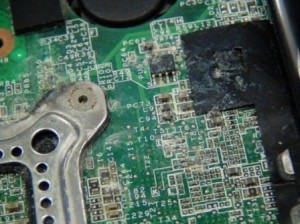Laptop shopping for those who know nothing about laptops
So last week my laptop died. When I took it to the computer store, the computer guy plugged it in and it started smoking. Gone. Goodbye. But today I got the official call from the computer people offering their condolences as they relayed the bad news that my laptop was toast, and “oh, by the way, your warranty is no good”. Thanks computer tech-support lady.

Exploratory laptop surgery reveals Katie’s motherboard is fried
So I took to Facebook and ask all of our friends on the Used.ca page if they could help me in my search for a new laptop. I thought I would be flooded with Mac recommendations, but not so. Toshiba, Sony and Lenovo seemed to be fan favourites. So with my new recommendations (thanks Facebook friends!), I headed to the infobahn to find out more.
My only requirements were lightweight and longevity, the latter of which is unfortunately not a specification I can just look-up. For my purposes, (broadly, school and the internet) I also needed to consider memory and storage space, speed, and ports. Depending on what you need a laptop for, in addition to these basics there will be other specifications you might want to consider.
Like many who know nothing about computers beyond turning them on and opening up Word, the laptop “specs” mean very little to me – they are but a series of numbers and letters arranged in uninteresting ways. But now that I’m in desperate need of a new computer and very conscious about spending my money wisely, I needed to learn what all of these “specs” are – even just at a very basic, superficial level. So let me break down for you what I have learned.
RAM: Random-Access Memory is a type of computer data storage. When buying a new laptop, I have been advised, one should look at how much RAM is already in the computer and ask how much it can handle if you choose to upgrade it. The minimum amount of RAM a laptop should have is 2GB (GB = gigabyte. A byte is, roughly defined, a unit of digital information storage). For better performance, 4GB is ideal, and 8GB is even better. For my purposes, I’ll aim for somewhere between 2-4GB. Basically, the higher the RAM the higher the performance.
Memory Speed: This goes hand in hand with RAM. There are two ways memory speed are designated, both involving series of letters and numbers. For my purposes, all I need to know is which are faster and which are slower and aim for something recommended or average. This list from the Laptop memory buyer’s guide on About.com is helpful in this regard, and if you too are buying a laptop and don’t know where to start, give it a gander.
HDD: The Hard Disk Drive is another form of computer memory. Speed and size are considered here. Speed in a laptop is typically 5,400 revolutions per minute (rpm). Why is this relevant? This number is important for battery life and performance. In terms of size, most systems are between 250 and 640 GB, which is sufficient for a standard laptop.
CPU: The Central Processing Unit is the part of the computer that is in charge of the execution of computer programs and function. Different types of processors are recommended depending on what type of laptop you want to buy. This breakdown of CPU specs is helpful for reference.
Speaking of different types of laptops, the type of laptop you want to buy is also important to what specifications you need to know. Laptops are differentiated by size:
- Tablet PC, the smallest size, usually less than 3 pounds
- Ultra Portable (small), <11″ x <10″ Less than 1.3 inches thick, less than 4 pounds.
- Thin and Light (mid-size), 11-14″ x <11″, 1 to 1.4 inches thick, from 5-7 pounds.
- Desktop Replacement (largest) >13″ x >11″, more than 1.5 inches thick, more than 7 pounds and up.
Now armed with at least some basic knowledge about what all the numbers and letters mean, I can start some serious shopping and so can you! And you can even throw around some fancy computer acronyms in everyday conversation to impress your friends!